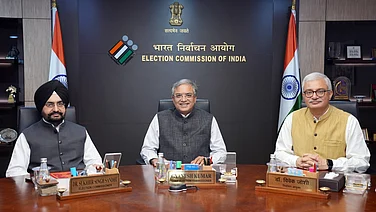Convicts too "must breathe fresh air" and be allowed to maintain social ties provided they show a tendency to reform, the Supreme Court has said and favoured a "humanistic approach" while dealing with pleas for parole or furlough to those serving long jail terms.
A bench of Justices A K Sikri and Ashok Bhushan asked the government to update its rules, framed way back in 1955, on granting of parole and furlough, saying these were skeletal in nature.
It referred to one of the objectives of awarding punishment and said it was about reformation of the convicts.
"There is an imperative and immediate need for updating these Rules thereby including comprehensive provisions in the light of the discussion...So as to provide suitable guidelines to those who have to consider such applications for grant of parole," it said, adding that the copy of its verdict be sent to the Ministry of Law and Justice.
The bench, however, said a person must remain in jail for the period of sentence awarded to him or her.
"It is in this context that his release from jail for a short period has to be considered as an opportunity afforded to him not only to solve his personal and family problems but also to maintain his links with society.
"Convicts too must breathe fresh air for at least some time provided they maintain good conduct consistently during incarceration and show a tendency to reform themselves and become good citizens. Thus, redemption and rehabilitation of such prisoners for good of societies must receive due weightage while they are undergoing sentence of imprisonment," it said.
The top court, in its verdict, referred to the grounds on which parole can be granted and said "the most important ground, which stands out, is that a prisoner should be allowed to maintain family and social ties."
It said the reason for grant of parole to maintain family and social ties also found justification in one of the objectives behind punishment that was reformation of convicts.
"When we recognise reformation as one of the objectives, it provides justification for letting of even the life convicts for short periods, on parole, in order to afford opportunities to such convicts not only to solve their personal and family problems but also to maintain their links with the society.
"Another objective which this theory underlines is that even such convicts have right to breathe fresh air, albeit for periods," it said.
A parole can be defined as conditional release of prisoners on good behaviour, with regular reporting to the authorities for a set period of time.
Furlough, on the other hand, is a brief release from the prison which is given in cases of long-term imprisonment.
The verdict came on the plea of one Asfaq, who is serving life term in connection with cases lodged under TADA for his role in serial bomb blasts that had taken took place in five trains on December 6, 1993.
The blasts had taken place in trains at Kota, Allahabad, Kanpur, Gujarat, Malkangiri and Karjat allegedly at the behest of certain miscreants on the first anniversary of the Babri Masjid demolition.
Asfaq had moved the apex court against denial of parole by the authorities. The court, however, upheld the decision of the Rajashtan High Court with a direction that he may file a fresh plea seeking parole after some time, if the situation warranted.


























